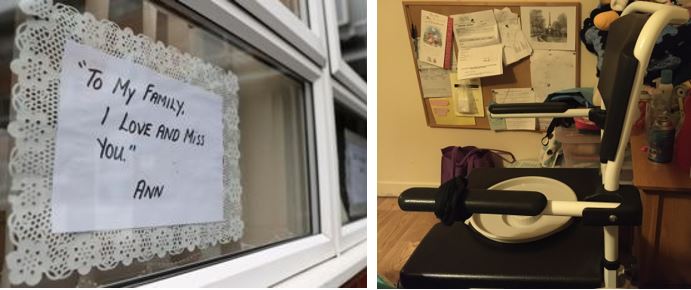
Disability groups including WinVisible have condemned the government’s breaches of rights under COVID. Reactions here.
Here is the full list compiled by DNS:
1 Ministers failed to offer recipients of so-called legacy benefits such as ESA the same £20-a-week benefit increase given to those on universal credit.
2 The Department of Health and Social Care (DHSC) took five months to produce guidance that aims to protect disabled people in supported living services during the pandemic.
3 Justin Tomlinson, the minister for disabled people, failed to carry out meaningful engagement with disabled people’s organisations during the early months of the pandemic.
4 DHSC drew up a strategy that allowed patients infected with COVID to be discharged from hospitals into residential homes, as part of a so-called “safe discharge” scheme regulated by the Care Quality Commission.
5 DHSC released new guidance for those seen as clinically extremely vulnerable to the virus, less than 24 hours before the England-wide lockdown that began in November.
6 Disabled people seen as extremely vulnerable to coronavirus were initially only placed sixth in the priority list for a COVID-19 vaccine when it was first published in November.
7 After the priority list was altered, following pressure from disabled campaigners, there were further concerns that hundreds of thousands of disabled people with underlying health conditions were still not being treated as a priority for the vaccine.
8 The government failed to provide shielding information in an accessible format to visually-impaired people, as well as failing to provide other information and guidance in an accessible format, including for BSL-users.
9 Government departments, including the Ministry of Justice and the Department for Work and Pensions (DWP), refused to allow many disabled staff to work from home, forcing them to go into work, and also refused other reasonable adjustments.
10 The emergency Coronavirus Act restricted rights to care and education and the rights of people in mental distress.
11 The first official statistics showing how many disabled people were dying with coronavirus were not published until late June, even though disabled people were being disproportionately affected by the pandemic.
12 Many disabled people who receive direct payments to pay for their personal assistants were unable to access personal protective equipment in the early months of the pandemic.
13 The government only published guidance to help people on direct payments more than five weeks after it had published guidance for the wider social care sector.
14 NHS England guidance on banning visitors to patients discriminated against disabled people with high support needs, while NHS England then failed to consult disabled people on a new version of the guidance.
15 The government’s test and trace programme was not accessible to many disabled people.
16 Direct payments users were given only two days to digest new government guidance if they wanted to take advantage of the government’s COVID-19 job scheme for their personal assistants.
17 Shielding MPs were not able to take part remotely in House of Commons debates.
18 Delays in testing social care staff led to thousands of disabled and older residents of care homes becoming infected with COVID-19 and losing their lives.
19 Hospital patients were discharged into care homes without being tested for COVID-19, causing the loss of thousands of lives.
20 The government’s Disability Unit stayed silent on its web page from 2 April to 20 July, while thousands of disabled people were dying from COVID-19.
21 DWP re-introduced benefit sanctions in early July, while millions of disabled people were shielding from the virus.
22 Social care workers were omitted from a list of workers exempt from having to self-isolate for two weeks after entering the country, ignoring the support needs of disabled people.
23 Health and social care secretary Matt Hancock refused to provide guidance that would ensure disabled people had the same rights as non-disabled people to life-sustaining treatment if they contracted COVID-19.
24 The government introduced lockdown guidance (PDF) that discriminated against many disabled people who needed to exercise more than once-a-day.

Hi: With respect to the lack of uplift in legacy benefits, I received a response from the government addressing this issue, not too long ago. The government has a green paper coming out in which they plan to eliminate legacy benefits and transfer everyone to Universal Credit. Does anyone else feel as if they are losing the will to live? Best wishes, Rona
Sent from Yahoo Mail for iPhone